>> Access our What Workers Want 2026 findings <<
In a sign that the Great Resignation may be losing pace, the annual 'What Workers Want' survey by New Possible finds that 33% of UK employees are considering a new job in the next 12 months - a 7% decline on the previous two years.
We also find that flexibility is now top-of-mind when it comes to an employee’s likelihood to stay, with 50% of employees who don't currently have flexible working options saying they’re likely to change jobs in the next year.
Our survey also reveals above inflation pay expectations. When asked about a 'fair' pay rise for 2024, employees on average wanted an 8% increase, slightly below 2023 (9%).
In this article we’ll deep-dive into responses from 2,017 UK employees to discover how they’re feeling about work. We’ll identify what’s driving employees to search for a new role and highlight the benefits they value most. We’ll also examine wellbeing and perceptions of job security.
Key takeaways
- Employees in the IT, finance, and engineering sectors continue to be the most satisfied, contrasting with workers in hospitality and retail who had the lowest levels of job satisfaction.
- Retaining employees will continue to be a challenge in 2024, with 33% of UK employees saying they’re likely to look for a new role in the next 12 months. This marks a 7% decline on the previous two years, suggesting the Great Resignation may be losing momentum.
- Unhealthy work culture, poor leadership, and pay dissatisfaction remain the key reasons employees consider leaving their jobs, whereas flexibility and good colleagues greatly boost job satisfaction.
- 50% of employees without flexible work options are considering a job change in the next year.
- On average, employees view a 8% pay rise in 2024 as ‘fair’, 4.1% above inflation (as of Nov ‘23).
- 32% of employees report a decline in their wellbeing over the past year, with the greatest declines seen in the healthcare, transport, public services, hospitality and retail sectors.
- Gen Z and millennials no longer lead the Great Resignation, with 35-44's most likely to search for a new role within the next 12 months (40%).
- When searching for a new job, the benefits employees value most include greater flexibility, the ability to work from home and more holiday.
- 10% of employees believe their job is at risk of redundancy, with those in technology, creative arts, marketing, and hospitality feeling the least secure.
- The creative arts sector, once the highest-rated for satisfaction, now sees the highest likelihood of employees seeking new roles.
What motivates employees to stay in a role or jump ship?
To identify the key drivers that motivate employees’ decisions to stay or leave their jobs, we asked respondents of our ‘What Workers Want’ survey to tell us about the best and worst aspects of their jobs. The responses were then split into the following two groups and processed by our AI model:
Likely to leave: Those who said they are likely or very likely to leave their job in the next 12 months.
Likely to stay: Those who said they are likely or very likely to stay in their job.
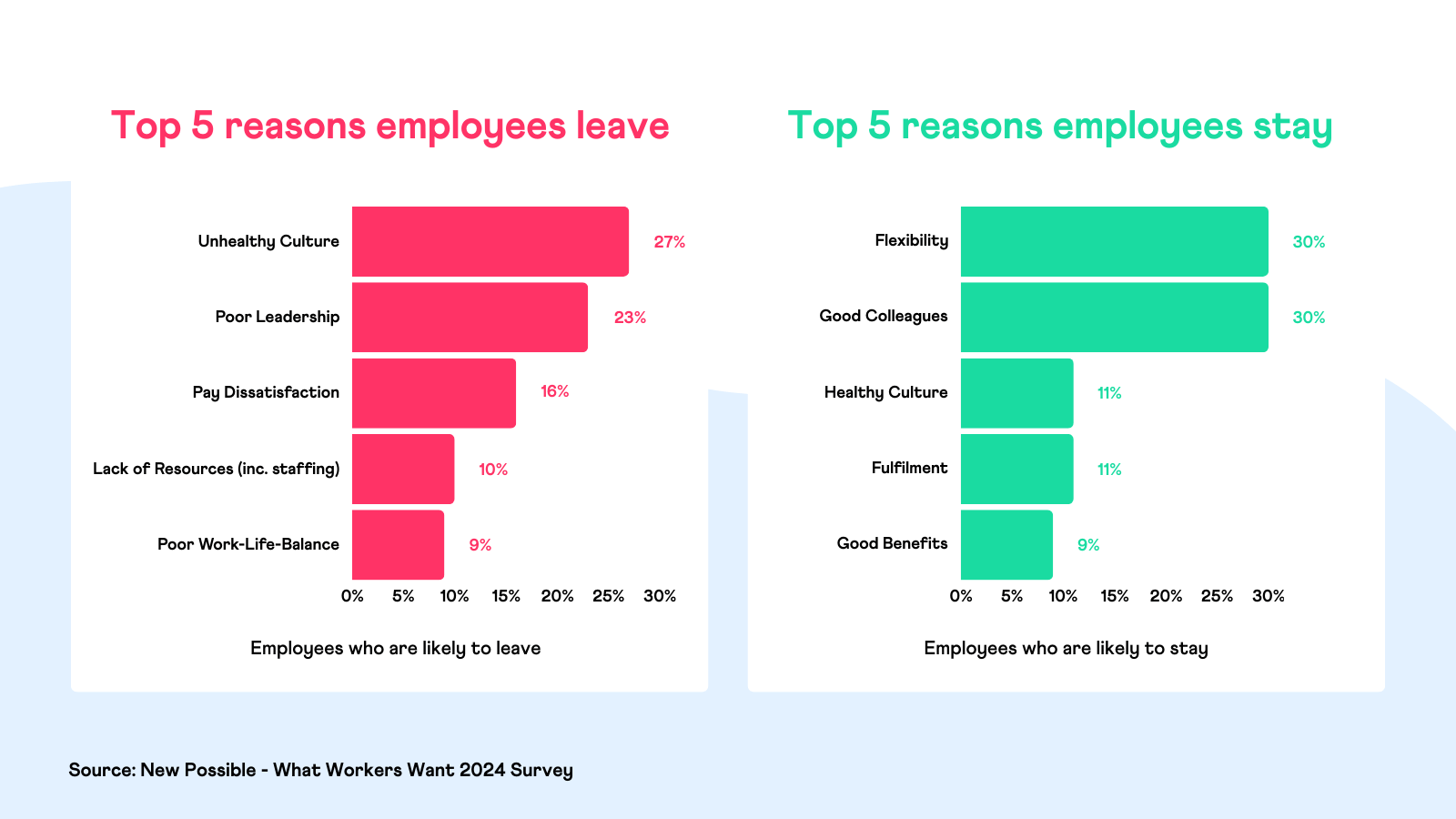
Unhealthy culture, poor leadership and pay dissatisfaction remain the top reasons employees leave
Unhealthy culture, poor leadership (inc. managers) and pay dissatisfaction are the key drivers behind employees leaving. When either driver is mentioned by an employee, they’re much less likely to praise other areas of the people experience.
But what is meant by culture? Below we highlight the most common words used by employees to describe what an unhealthy work culture means to them:
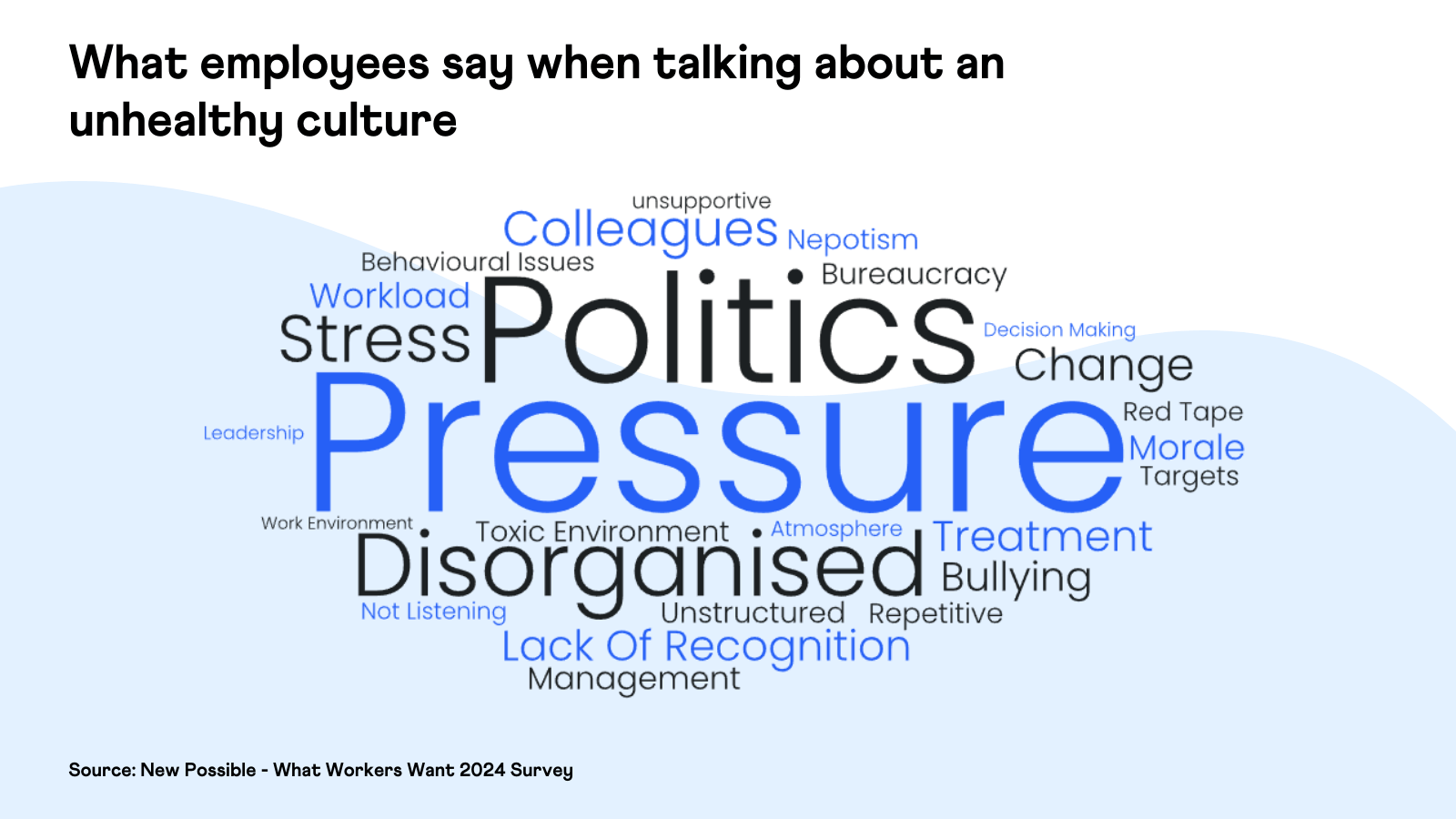
Employees were asked what they thought a ‘fair salary increase for 2024’ would be. Here’s what they said:
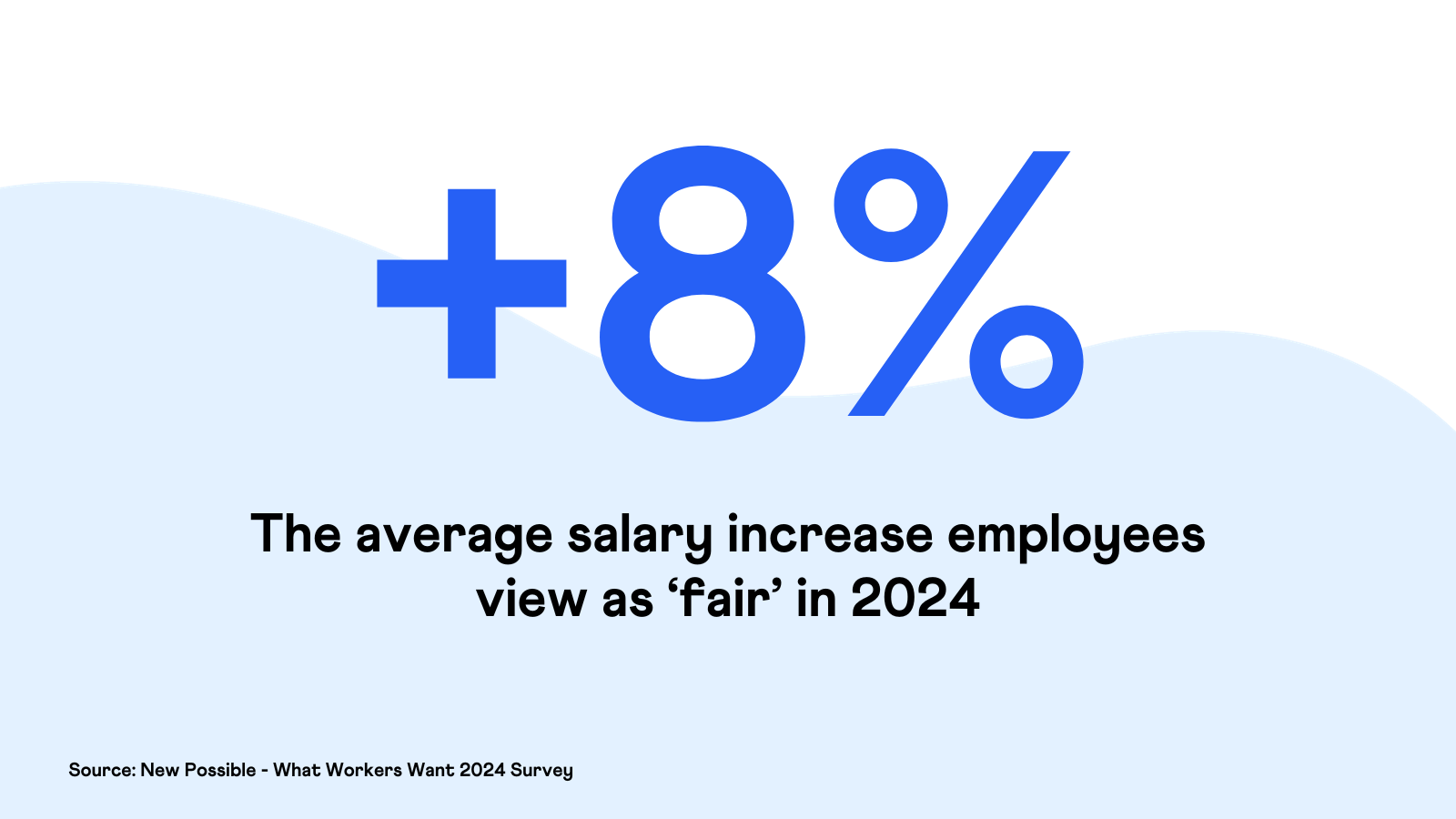
Although inflation has steadily decreased over the past 12 months, falling to 3.9% in November 2023, pay remains a significant factor for employees considering a change, with 16% of respondents citing it as a key motivation for leaving (vs. 17% in 2023). When asked what a ‘fair’ pay rise in 2024 should be, the average response was 8%, slightly below expectations reported in our previous ‘What Workers Want’ survey (9%) yet significantly exceeding the current inflation rate.
Healthcare and hospitality sector employees more frequently suggested higher pay. Given the lower average wages in these sectors, workers there are likely more vulnerable to the impacts of rising prices and interest rates.
What other drivers are motivating employees to think about leaving?
Insufficient resources, particularly staff shortages, emerged as a common frustration. These shortages often lead to employees working longer hours and with greater intensity, resulting in reported feelings of 'pressure' and 'stress'. Notably, 44% of those who mentioned resource constraints as a reason for leaving also reported a decline in their wellbeing over the past year, compared to 32% across all respondents. Workers in education, IT and healthcare were more likely than others to highlight issues with resources.
Similarly, work-life balance was identified as another pain point. Long hours, lack of flexibility, and irregular shift patterns were frequently cited as contributing factors.
Flexibility and good colleagues are the top reasons why employees stay
Flexibility and good colleagues have emerged as the top reasons why employees stay, with flexibility now equally as significant as colleague relationships, marking a 7% increase from the previous year.
We define flexibility as a way of working that suits an employee’s needs, for example having flexible start and finish times, or working from home.
56% of employees say their employer offers flexible working
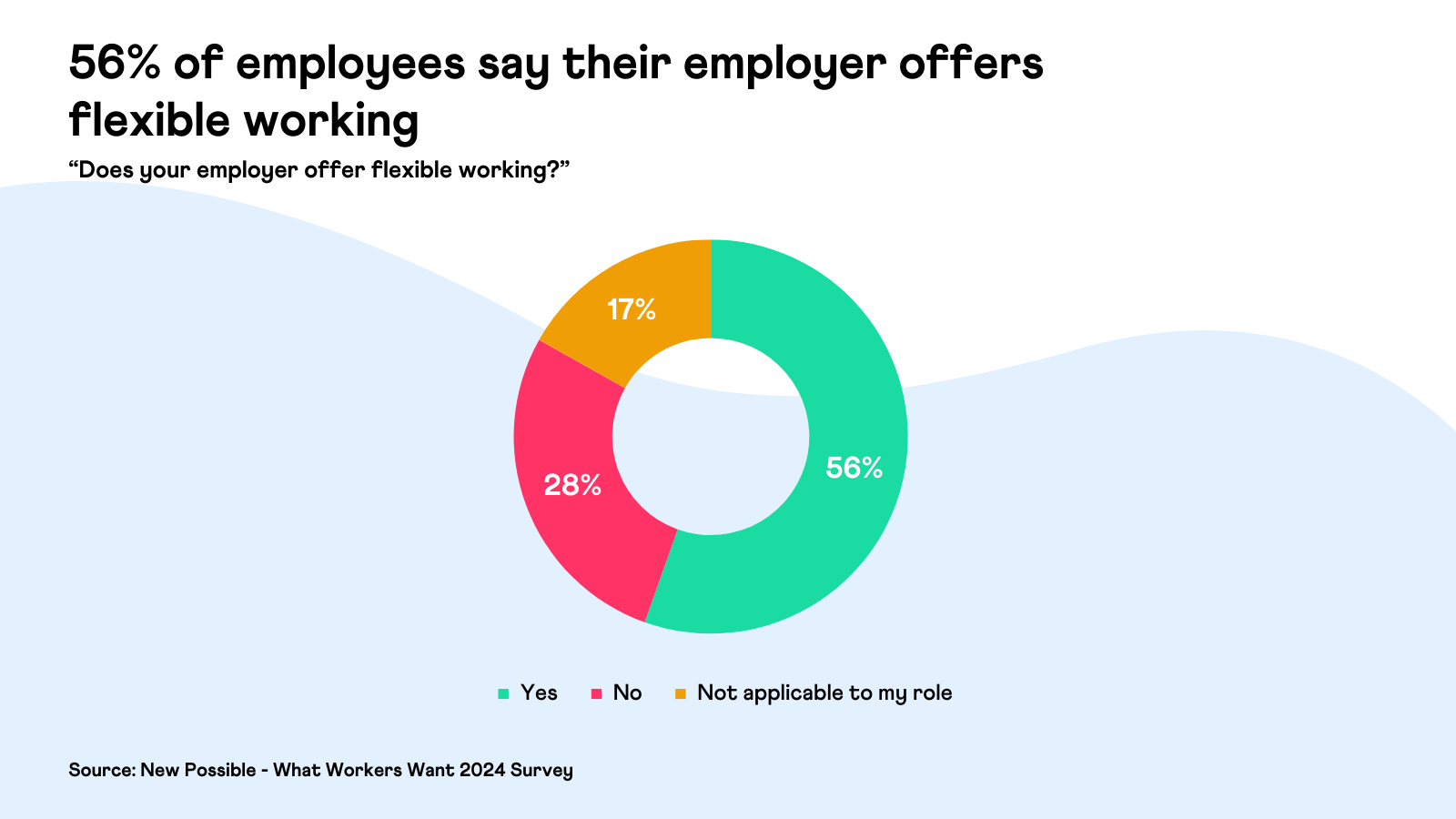
56% of respondents reported their employer was flexible, compared to 28% who said it’s not offered. 17% said it’s ‘not applicable to my role’.
Half of workers without flexibility plan to exit within a year
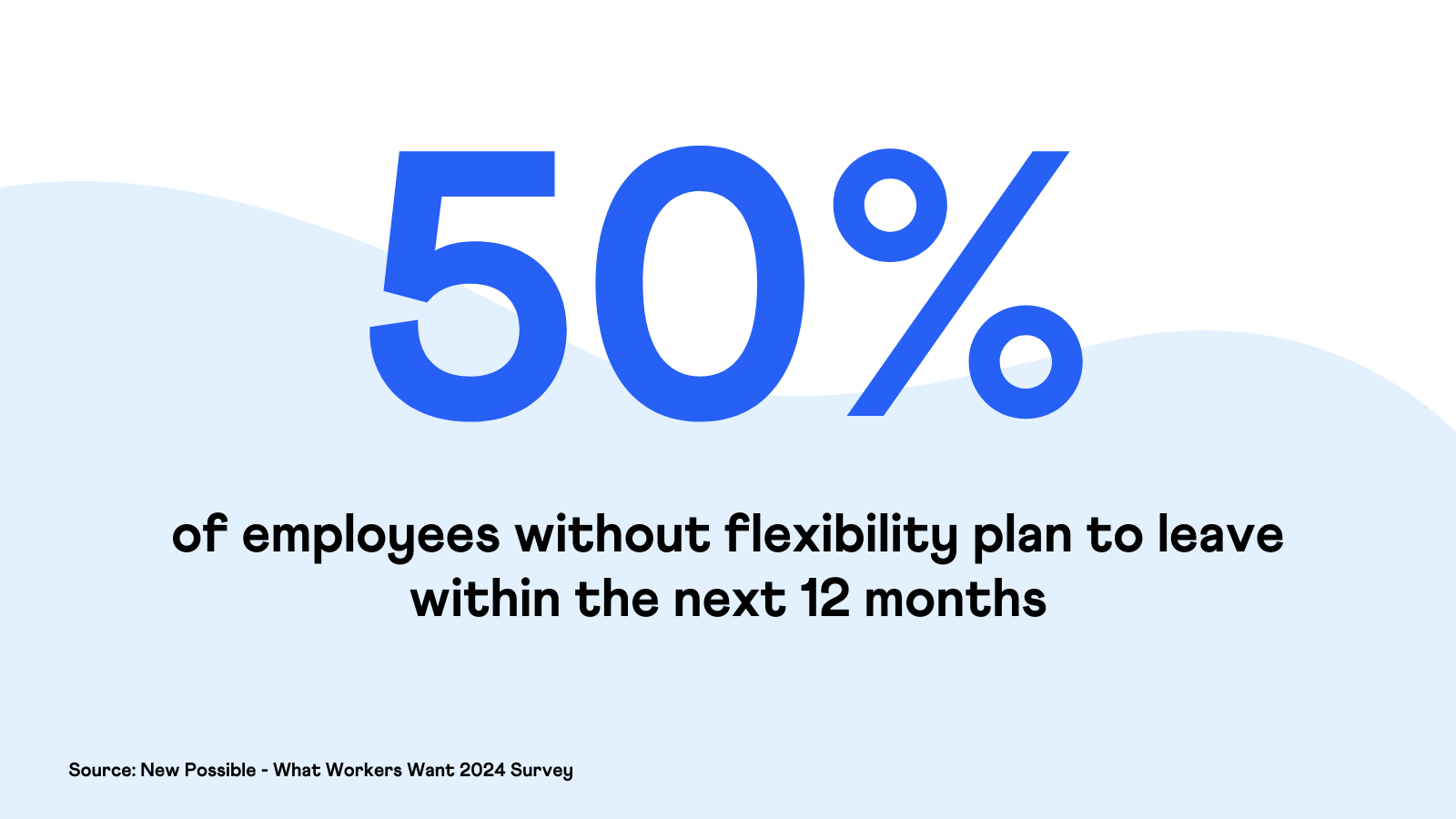
50% of employees without flexibility say they're likely to leave within the next 12 months, compared to 28% of employees who have flexible working options.
This finding is particularly significant given a recent survey by KPMG that revealed 64% of CEOs expect their employees to return to the office full-time within the next three years.
Our findings suggest that firms offering flexibility increasingly stand out in both the eyes of existing and potential employees.
The link between flexibility, leadership and work-life balance
Employees that have flexible working options are less likely to express negative views about managers and leaders. They are also less likely to mention a poor work-life balance.
What other drivers are motivating employees to stay?
Culture is mentioned by 11% of employees who are likely to stay, vs. 27% of employees who are likely to leave. This suggests that a healthy culture is a critical hygiene factor; when done well, it’s not often mentioned, but without it, organisations will likely see employees searching elsewhere.
Employees also value a job that is purposeful, with 11% of workers likely to stay talking about the importance of fulfilling and engaging work.
Good benefits were also linked to higher retention, mentioned by 9% of employees who are likely to stay (3% higher than 2023). Below we look at what benefits employees say they value most.
73% of employees want greater flexibility
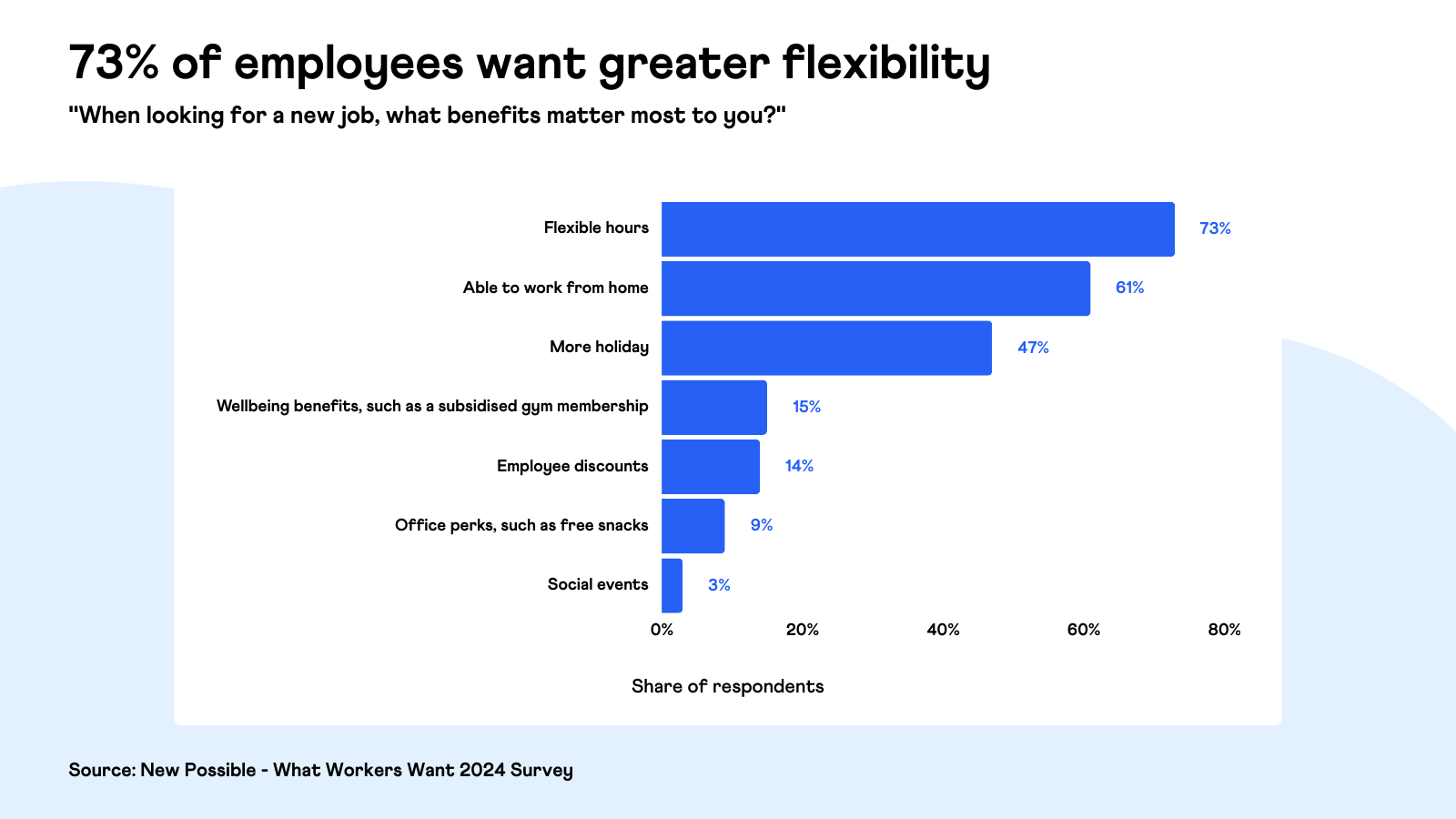
When asked about what benefits matter most when looking for a new job, flexible hours (73%), working from home (61%) and more holiday (47%) emerged as the most popular options.
When exploring key differences by age, younger workers aged 18-24 and 25-34 were most likely to want office perks, such as free snacks (25% and 16% respectively), while the demand for flexible hours was greatest for those aged 35-44 (77%). Employees aged 65+ were least likely to want to work from home (41%).
32% of employees say their wellbeing has declined over the past year
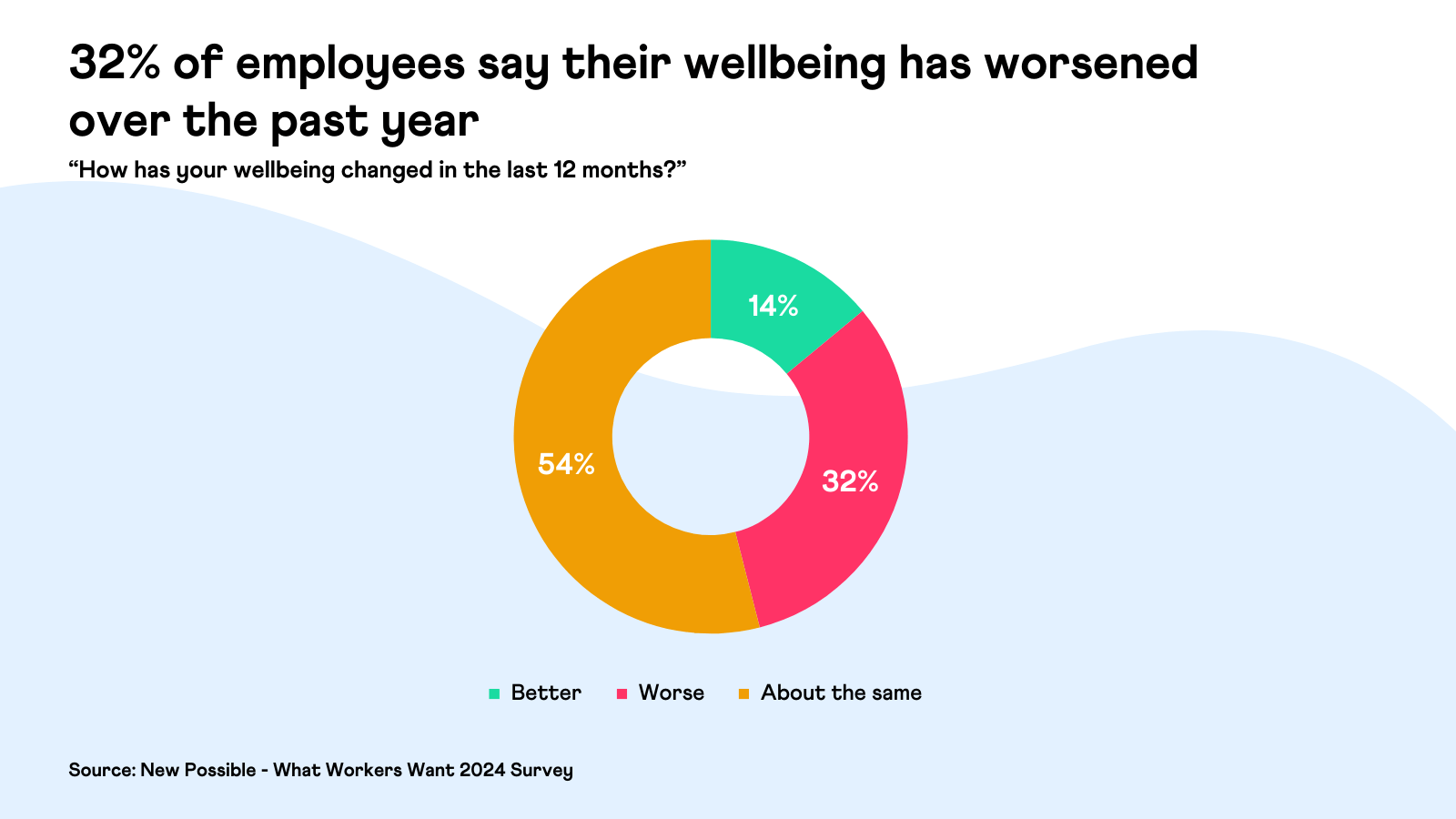
32% of employees say their wellbeing has declined (vs. 34% the previous year).
Employees in healthcare (41%), transport and logistics (37%), public services (36%), hospitality (35%) and retail (35%) have suffered the biggest fall in wellbeing over the past 12 months.
10% of employees think they are at risk of redundancy in the next 12 months
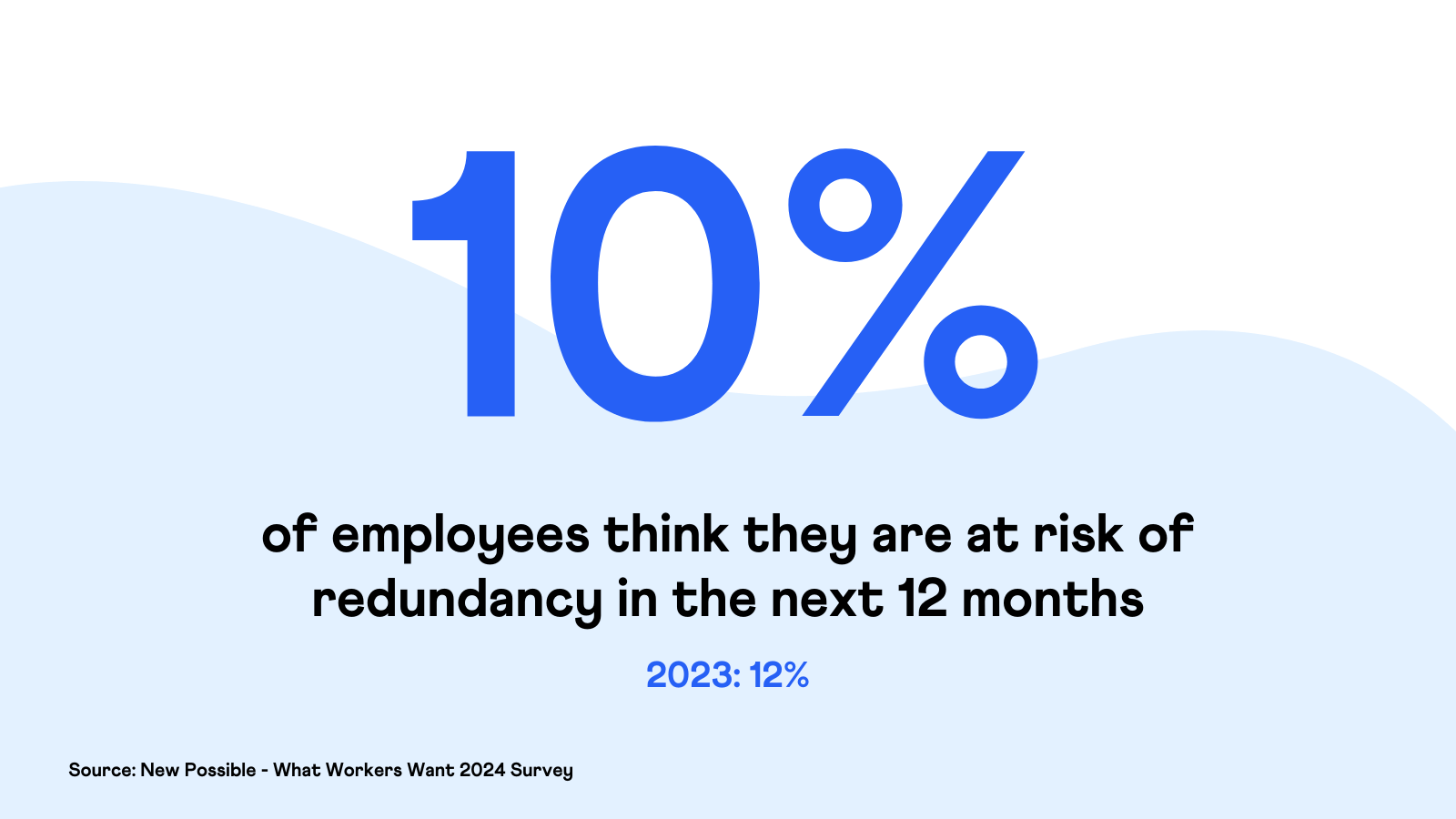
Employees in technology (35%), creative arts (28%), marketing (25%), and hospitality (17%) were most likely to believe their job is at risk of redundancy. In contrast, employees in public services (7%), and transport and logistics (7%) felt least at risk.
Industry comparison
Average job satisfaction across all sectors is 69% (in line with 70% a year earlier). IT, finance, engineering and manufacturing once again had some of the most satisfied employees. In contrast, workers in hospitality and retail were the least satisfied.
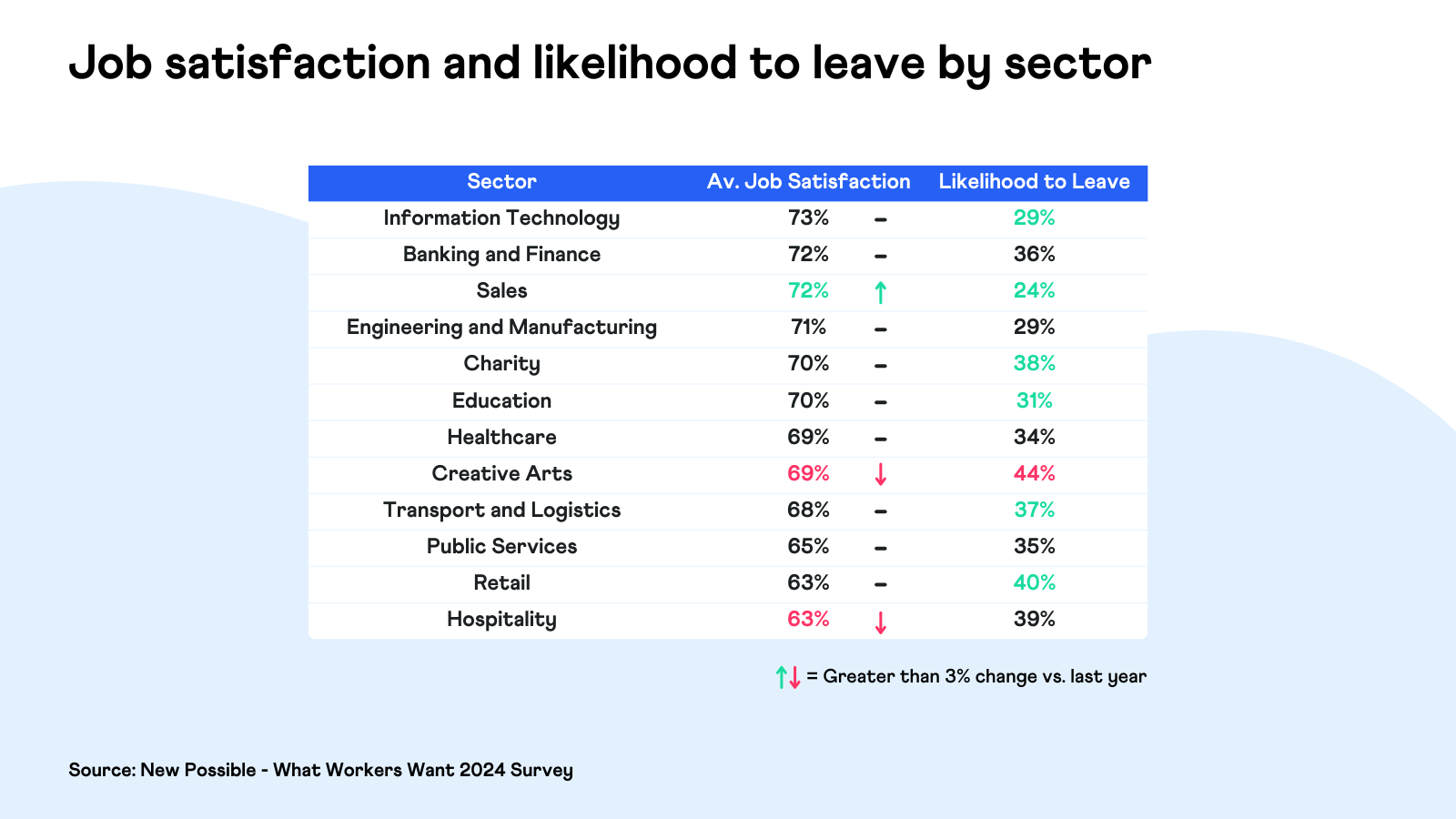
Creative arts was previously the highest rated sector, but now attracts the highest likelihood to leave, with 44% planning to search for a new role over the next 12 months. Employees commented on a lack of job security, low pay, and unpredictability. Hospitality also experienced a significant drop in employee satisfaction (down 9%), with pay and work-life balance having the greatest downward pull.
Gen Z and millennials no longer lead the great resignation
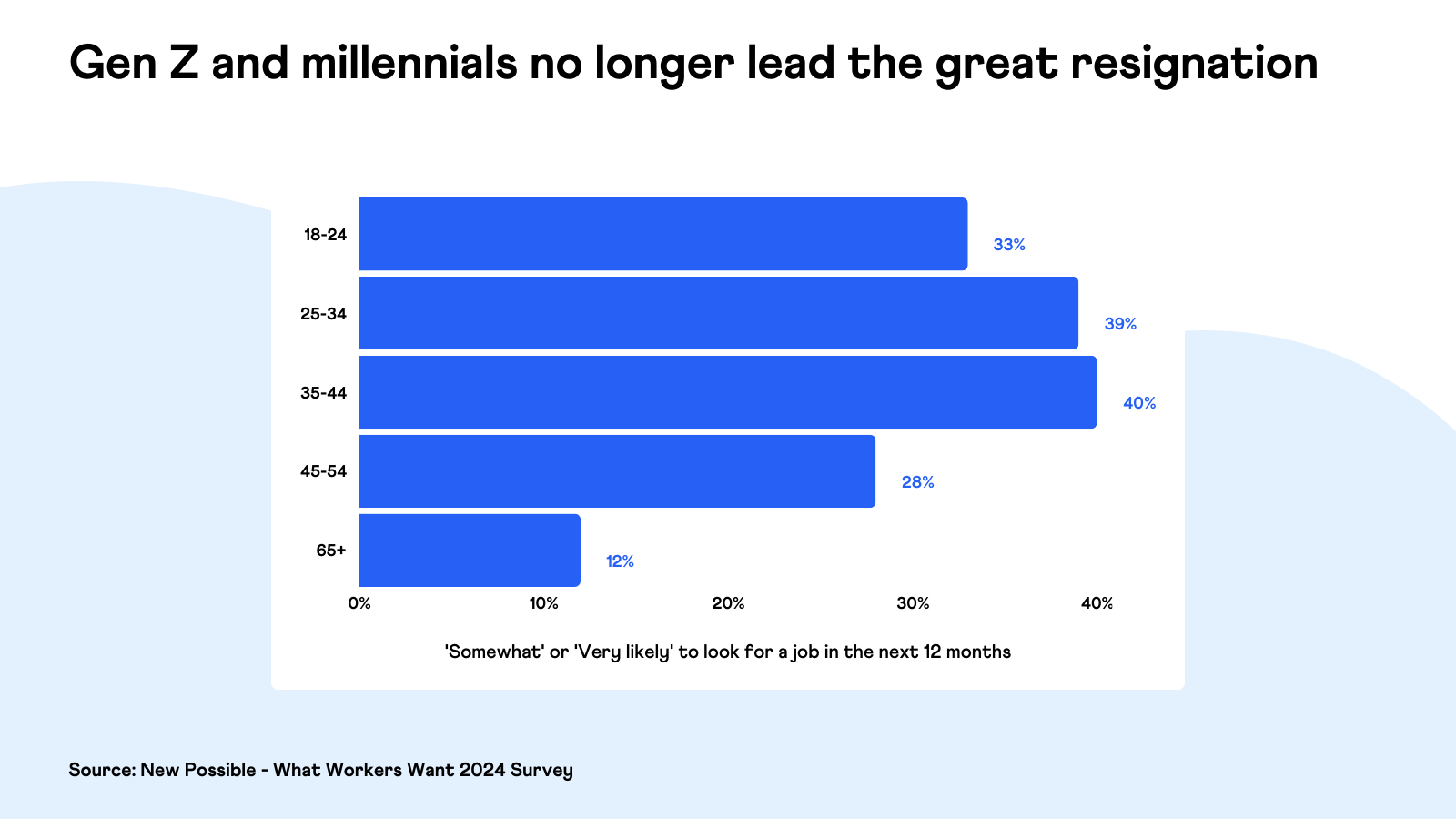
Employees aged 18-24, who were previously at the forefront of the Great Resignation, have shown a 20% decline in their likelihood to leave. A less dynamic job market for early careers may be deterring younger workers from jumping ship, with recent data from Adzuna indicating a 32% reduction in graduate opportunities compared to a year before.
There was no change for those aged 35-44, with 40% planning to look for a new role in the next 12 months. Meanwhile, employees over 65 continue to be least likely to leave.
About New Possible
New Possible is the people insight platform that’s committed to your success. We work with a range of sectors to provide clear, actionable, and benchmarkable insights across the employee lifecycle. Our NP360 survey helps leaders gain meaningful insight into the broader people experience, measuring 7 themes, including satisfaction, culture, and wellbeing. Read about our mission, or book a demo to learn more.
If you’d like to discuss this research further, please email hello@newpossible.io or call 0161 706 0618.
Notes
New Possible’s What Workers Want survey captured responses from 2,017 UK employees between November 20th and December 8th 2023. Research by Nate Harwood and Ava Kaveh.

